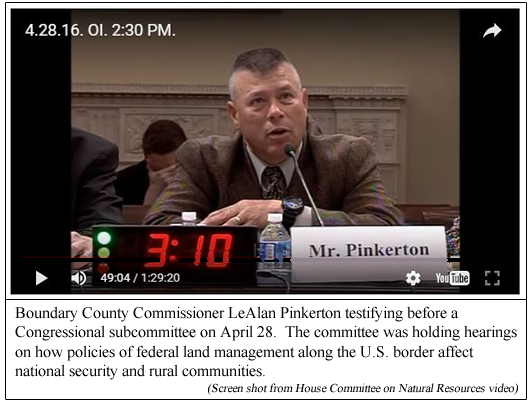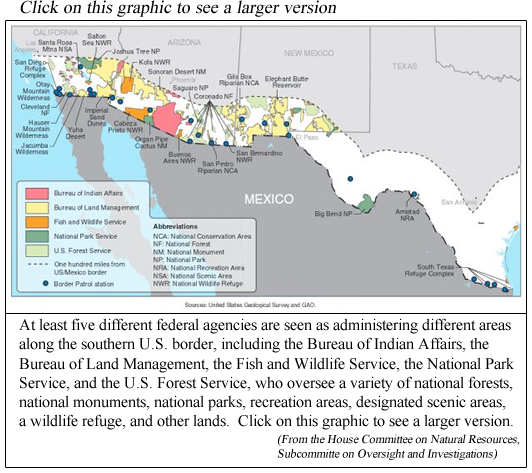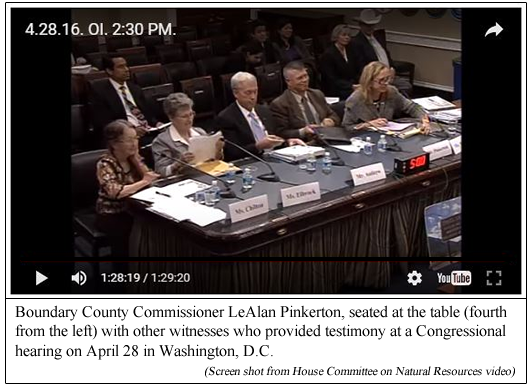|
|
|
Boundary County Commissioner Pinkerton testifies
before Congressional subcommittee |
|
May 9, 2016 |
In a recent afternoon, a Washington, D.C.
congressional hearing turned its attention to
Boundary County in seeking information about how
federal land management policies impact rural
communities along the border, and the effects of
these policies on enforcement of border
integrity and safety. Boundary County
Commissioner LeAlan Pinkerton appeared before
the congressional subcommittee, where he had
been invited as a witness to present testimony
eleven days ago, on April 28.

The House of Representatives Committee on
Natural Resources, subcommittee on Oversight and
Investigations convened the hearing, formally
entitled The Consequences of Federal Land
Management Along the U.S. Border to Rural
Communities and National Security, and
invited several witnesses to testify who had
direct experience or knowledge of the impact of
federal land policies in areas along the
nation's borders. Mr. Pinkerton was the only
witness from the country's northern border,
other witnesses being from the U.S. - Mexico
border, or from government agencies involved in
the issue.
The subcommittee, chaired by Representative
Louie Gohmert, R-Texas, with Idaho District 1
Representative Raúl Labrador as Vice Chair,
invited Commissioner Pinkerton to travel to
Washington D.C. and testify, based on his
background as a former Border Patrol agent and
his current position as Commissioner of a rural
border county. Other witnesses testifying at the
hearing included Jon Andrew of the U.S.
Department of the Interior, Sue Chilton of the
Chilton Ranch in Arivaca, Arizona, Tricia
Elbrock who operates with her family a water
service company and Elbrock Ranch in southern
New Mexico and also represents the New Mexico
Cattle Growers' Association, and Nan Stockholm
Walden, Vice President and Counsel for Farmers
Investment Company and Green Valley Pecan
Company in Sahuarita, Arizona.
Border counties such as Idaho's Boundary County
are at the frontier of border protection and
security for the United States. It happens that
very many of these border counties are rural
communities, with economic challenges, and often
have remote, isolated wildlands within their
reaches.
The subcommittee convened to discuss and hear
testimony on how federal land management
policies impact our national security, the
nation's border counties, their communities, and
the people who reside in those areas.
In its memo issued prior to the hearing, the
subcommittee stated "Congress mandated that the
Border Patrol achieve “operational control' of
the international borders of the United States.
Operational control is defined in statute as
'the prevention of all unlawful entries into the
United States, including entries by terrorists,
other unlawful aliens, instruments of terrorism,
narcotics, and other contraband.' While Congress
has authorized large increases in manpower and
equipment for the Border Patrol, it has left
regulatory obstacles in their path which make
operational control less attainable."
The memo went on to say that Border Patrol
agents often find their access to restricted
areas of Forest Service land or other federal
lands to be limited by federal land policies and
regulations, which significantly impacts their ability to
patrol the border and enforce border security.
"On federal land, the Border Patrol must obtain
permission to place monitoring equipment, to move
equipment, to place temporary camps nearer to
the border, and even to maintain roads. Land
managers can take months to grant these
authorizations to Border Patrol. At times,
permission is not given, leaving heavily
trafficked areas unprotected," according to the
subcommittee memo.
Part of the problem is illustrated in the
following graphic, obtained from the
subcommittee memo, which illustrates how many
federal agencies and departments are involved in
the administration of federal land along the
southern border. In this graphic, at least five
different federal agencies are seen as
administering different areas along the border,
including the Bureau of Indian Affairs, the
Bureau of Land Management, the Fish and Wildlife
Service, the National Park Service, and the U.S.
Forest Service, who oversee a variety of
national forests, national monuments, national
parks, recreation areas, designated scenic
areas, a wildlife refuge, and other lands. The
Border Patrol has to deal with all of these
entities in trying to access all the land along
the border to carry out its mandate of
operational control of the border.

In his testimony before the subcommittee, Mr.
Pinkerton outlined his view of how this problem
affects border security in our area. "The U.S.
Border Patrol shoulders the daunting task of
patrolling the rugged and remote land masses of
the Selkirk, Purcell, and Cabinet Mountain
Ranges, as well as all areas in between," Mr.
Pinkerton told the subcommittee members. "The
overwhelming majority of the area is mountainous
and timbered. Access is vital to the success of
securing the border and affords the Border
Patrol the ability to secure these remote areas,
maintain a secure border, and expand into
adjoining areas."
"Access restrictions create debilitating effect,
and vast areas of the border go infrequently
monitored, or go without patrol altogether," he
continued. "Resource managers have placed these
restrictions primarily because of [Endangered
Species Act] standards and biological opinions
to limit motorized traffic into recovery zones
of the grizzly bear . . . each patrol into the
recovery zone is subject to the administrative
trip cap, being shared among all agencies. The
land managers put up gates on roads and do not
provide a key, remove culverts, decommission
roads, etc. They seldom give any notification or
forewarning."
"An example of this is the Ball Creek Road
closure. It's closure can add up to 3 1/2 hours
of travel in making responses, rendering about
25 miles of the border unsecurable. This type of
conflict is largely repetitive in many locations
and jurisdictions along our northern border. "
Aside from national security issues at the
border, Mr. Pinkerton also outlined his concerns
on the economic impact of federal land policies
to rural areas, stating that courts are
inappropriately involved in land management.
"Due to litigation, the courts essentially make
critical forest management determinations," he
said. He went on to state that restricted land
management policies have also contributed to the
increased risk of wildfires in our area.
Representatives on the Congressional
subcommittee questioned Mr. Pinkerton further on
these issues. Representative Raúl Labrador asked
Mr. Pinkerton how secure the northern border is
today. "I wouldn't consider it secure in any
fashion," he replied. "As a matter of fact, if
you date back to the 1970s, it's probably
somewhere in the same realm as far as being
secure. It's not secure."
Representative Labrador later asked Mr. Andrew,
who is the Interagency Borderland Coordinator
for the U.S. Department of the Interior, about
cooperation between all the different federal
agencies in protecting the borders. "There's
obviously some issues, as Mr. Pinkerton has
pointed out, that we need to work on, but in
other areas the implementation of the
[interagency Memorandum of Understanding] has
been very successful," he replied. He later went
on to add, "It has worked well in some places.
At Ball Creek in Idaho it's been a challenge, to
be honest. We're getting better at it, I think
we're on the right track now. And we've had some
discussions here with Mr. Pinkerton that have
been very educational for me."
Representative Labrador asked if Border Patrol
agents are hampered by denied access to certain
areas of the border. "I hope not, it's not my
intention, replied Mr. Andrews. "I work to
assure that the Border Patrol has the access
they need when they need it. I can't say that
we're perfect with it, but I'm very willing to
work on making that better wherever needed."
Mr. Pinkerton was later questioned by
subcommittee member Amata Radewagen, the
Delegate for the United States House of
Representatives from American Samoa:
"Commissioner Pinkerton, as someone with decades
of experience in Border Security, particularly
on federal land, how do environmental
restrictions hamper border security operation
and how has this problem become better or
worse?"
"Well, I would echo that the Memorandum of
Understanding has been put in place to solve
some of these problems," he replied. "To be able
to improve upon border security, the access is
of the utmost importance. Where these roads
exist, I don't believe you should have to go
through and get another environmental impact
statement put on it before you can drive a
vehicle across it again. I don't believe your
law enforcement should be hampered by having to
stop every four or five miles to open another
locked gate."

The full video of the subcommittee hearing,
which includes Commissioner Pinkerton's
testimony, can be found by
clicking on this link. (If
by chance that doesn't work,
try this link).
In the hour and a half video, Mr. Pinkerton's
testimony is located at the 36:00 mark, where he
is introduced by the chairman, Representative
Gohmert. In the video, Mr. Pinkerton answers
additional questions from subcommittee
members Raúl Labrador at the 48:48 mark and
Amata Radewagen at the 1:12:20 mark.
On his return back home to Boundary County, Mr.
Pinkerton was asked what it was like to testify
before Congress. "I was deeply honored to
represent Boundary County before the committee,"
he replied. "After all, the impacts that forest
management has on our community is extremely
important to all of us who live here. In
addition, as a career Border Patrol Agent, I am
somewhat uniquely experienced to able to answer
any questions the committee may have had
regarding the border security issue and the
access needs of the Border Patrol."
He was further asked if his trip, which was paid
for out of the Boundary County Commissioner's
travel budget, afforded any time for
sight-seeing in the nation's capitol.
"Unfortunately, I had no spare time to explore
the city," he said. "I flew in late Wednesday
night, testified on Thursday, and flew home
early Friday. Luckily, the building where I gave
testimony was directly across the street from
the capitol building. At least I was able to see
that—from a distance."
Mr. Pinkerton further stated, "I only hope that
my testimony had meaning. That it will provide
some help to Congress in getting our forests
back to supplying our community with the
resources we need, and that our public accesses
will be revived.
"I would also like to add that Representative
Labrador represented the needs of Idaho
admirably during the hearing. I was proud of his
actions and his leadership to the subcommittee
with this issue."
A full transcript of Mr. Pinkerton's
testimony and remarks can be viewed by clicking
here.
|
|
|
|
Questions or comments about this
article?
Click here to e-mail! |
|
|
|
|

